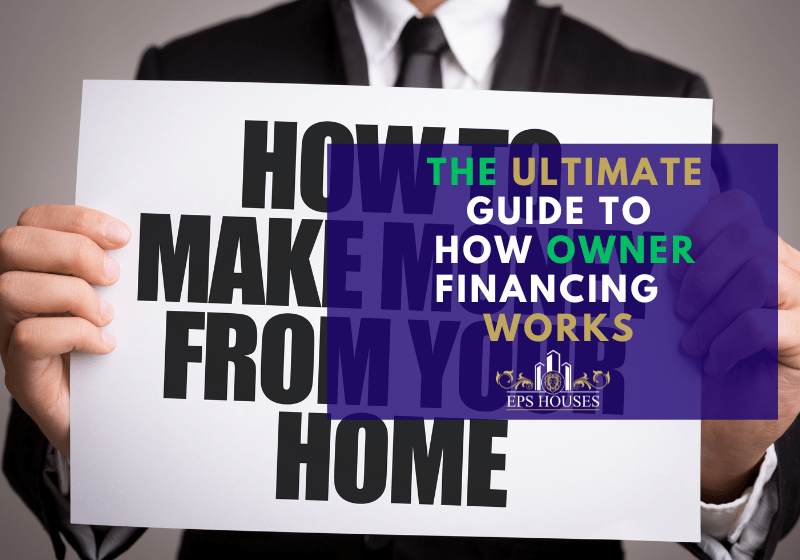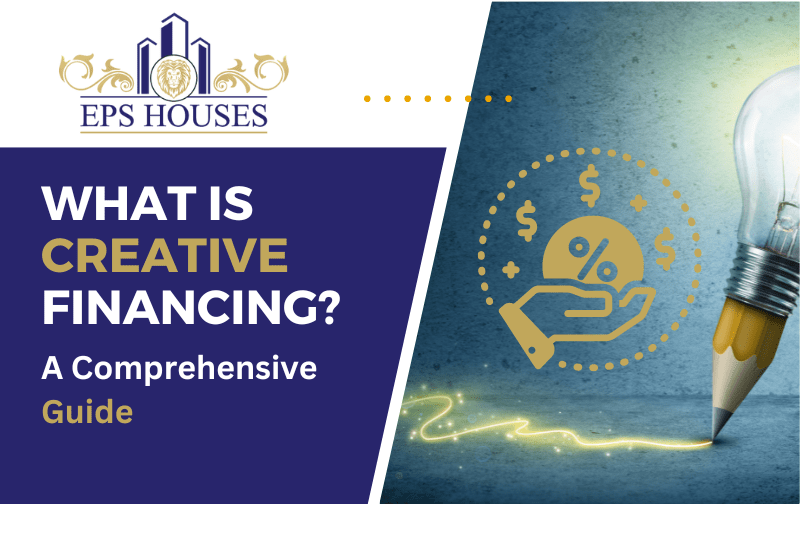In today’s property market, various Creative financing strategies are at buyers’ and sellers’ disposal.
One gaining momentum is owner financing, where the property’s seller acts as the lender, financing the purchase for us, and EPS Houses as the buyer. This route circumvents traditional mortgage lenders. Here’s a deep dive into how it works and its pros and cons.
What is Owner Financing?
Owner financing, also termed seller financing or owner carryback, is where EPS Houses, as the buyer, receive financing from the property’s seller. Unlike traditional arrangements where we’d secure a mortgage loan from a bank, the seller steps in, financing our purchase. We then make direct payments to the seller.
Owner financing is a promising option for us at EPS Houses and sellers alike, given its flexibility around loan terms and payment schedules. It benefits us when traditional mortgage loans are off the table or a large down payment is required. Sellers can also profit by selling faster and at a higher price. Yet, owner financing has its risks. Default and foreclosure are real dangers. Therefore, engaging experts, such as real estate attorneys, is crucial before venturing into an owner-financing deal.
How Does Owner Financing Work?
In owner financing, the seller doubles up as the lender, facilitating the property purchase. The financing terms, encompassing interest rate, payment schedule, and loan duration, are jointly agreed on by EPS Houses and the seller. Once agreed, the seller funds the purchase.
We then pay the seller directly according to the pre-agreed schedule. The seller retains a lien on the property until we fully repay the loan. After loan completion, the seller releases the lien, transferring the property to EPS Houses.
Imagine we’re eyeing a property but are ineligible for a traditional mortgage loan. The seller proposes owner financing and agrees to fund our purchase. We agree, settling on a 6% interest rate, a $1,000 monthly payment, and a 5-year loan length. We pay the seller based on this schedule, and once the loan is fully paid, the seller transfers the property to us.
Remember that owner financing agreements vary greatly, with contract terms hinging on specific situations. Thus, engaging real estate attorneys before entering an owner-financing deal is crucial.
What are the Benefits of Owner Financing?
As buyers and sellers, owner financing harbors numerous advantages for us, EPS Houses.
Benefits for EPS Houses:
- Easier qualification: We may qualify for owner financing even if ineligible for traditional mortgage loans. Sellers exhibit more flexibility in setting loan terms and can work with us despite imperfect credit scores.
- Lower upfront costs: We could negotiate a more down or no down payment, making the property purchase more affordable.
- More flexibility: Sellers and I can adapt the loan terms, for instance, the interest rate and payment schedule, to our needs. This helps us manage our finances better.
- Faster closing: The fewer parties involved in owner financing facilitate a swifter closing process than traditional mortgage loans.
- Potential for better terms: We can negotiate more favorable loan terms with the seller than with traditional lenders.
Benefits for Sellers:
- Faster sale: Owner financing opens up their property to a wider buyer pool, including those who might not qualify for traditional mortgage loans, resulting in faster sales.
- Higher selling price: Sellers can command higher prices due to the flexibility of their loan terms.
- Steady income stream: By financing our purchase, sellers can enjoy a steady income stream through our monthly payments.
- Potential tax benefits: Depending on the transaction specifics, sellers might reap tax benefits like spreading capital gains over time.
- More negotiating power: The seller has more leverage in setting loan terms, ensuring a better deal than traditional lenders.
What are the Risks of Owner Financing?
While beneficial, owner financing has its risks.
Risks for EPS Houses:
- Potentially higher interest rates and fees.
- Risk of default and foreclosure.
- Risk of possibly losing the property if payments are not made on time.
Risks for Sellers:
- Risk of default and foreclosure.
- Risk of non-payment.
- Risk of having to foreclose on the property and evict the buyer.
Conclusion:
Bypassing traditional mortgage lending via owner financing provides an advantageous option for both EPS Houses and sellers. It offers easier qualification, lower upfront costs, more flexibility, faster closing, and the potential for better loan terms for us. For sellers, a quicker sale, higher selling price, a steady income stream, potential tax benefits, and more negotiating power are among the benefits. Yet, both parties must weigh all factors and engage professionals before proceeding with an owner-financing agreement. Like any financial transaction, owner financing carries risks and potential drawbacks that should be understood before deciding. Owner financing is a powerful tool for real estate transactions, worth exploring as an option. To get started please fill out our Seller property form.



